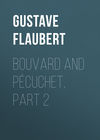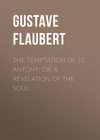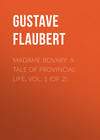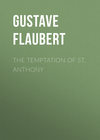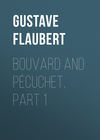Read the book: «Bouvard and Pécuchet, part 2», page 10
II
My personal reminiscences date from his return. He came back at evening; I was in bed, but they awakened me. He came to my little bed, raised me suddenly and found me very droll in my long nightgown; I remember that it extended far below my feet. He began to laugh very hard and then to imprint great kisses on my cheeks which made me cry; I felt the cold of his moustache, humid with dew, and was very glad when he put me down again. I was then five years old and we were at the grandparents’ house at Nogent. Three months later I saw him again in England, as I still remember distinctly. It was at the time of the first Exposition at London. They took me there and the crowd frightened me; my uncle took me on his shoulder, and I traversed the galleries overlooking everybody, this time happy to be in his arms. They chose me a governess and we returned to Croisset.
My uncle wished to begin my education immediately. The governess was to teach me only English; my grandmother would teach me to read and write, and for him was reserved history and geography. He believed it useless to study grammar, holding that it taught itself in reading, and that it was bad to charge the memory of a young child with abstractions, which one begins where often they ought to finish.
Then began some years when we were all together.
Croisset, where we lived, is the first village on the bank of the Seine in going from Rouen to Havre. The house, long and low in shape, all white, must have been built about two hundred years. It had belonged to the monks of the Abbey of Saint-Ouen whom it served for a country house, and it pleased my uncle to think that Prévost had composed Manon Lescaut here.
In the interior court, where still remained the pointed roof and the guillotine-shaped windows of the seventeenth century, the construction was interesting, but the façade was ugly. It had undergone one of those remodellings in bad taste that were seen so often in the first Empire and the reign of Louis Philippe, at the beginning of the century. Above the entrance, after the fashion of bas-reliefs, were some villainous casts, – the seasons of Bouchardon – and the mantelpiece in the salon had on each side a representation of a mummy in white marble, a souvenir of the Egyptian country.
The rooms were few, but sufficiently large. The spacious dining-room, which occupied the centre of the house on the ground floor, opened upon the garden by a glass door flanked by two windows in full view of the river. It was pleasing and gay.
On the next story, at the right, a long corridor separated the chambers, and on the left was my uncle’s study, or work-room. It was a large apartment, with a very low ceiling, but very light, because of five windows, of which three looked upon the whole length of the garden, the other two being in the front of the house. There was a pretty view of the turf, the beds full of flowers, the trees on the long terrace, and the Seine enframed in the foliage of a splendid tulip tree.
The ways of the house were subordinated to the taste of my uncle, my grandmother having, so to speak, no longer any personal life; she lived for the happiness of others. Her tenderness was in alarm at the slightest symptom of suffering which she thought she detected in her son, and she sought to envelop him in a calm atmosphere. In the morning she was on the defence against the least noise; towards ten o’clock the violent ringing of a bell would be heard, and some one would go to my uncle’s room; not until then did every one awake. The domestic carried him his letters and newspapers, deposited on the night table a glass of fresh water and a well-filled pipe; then he opened the shutters, and the light streamed in. My uncle would seize his letters, run over the addresses, but rarely did he open one before taking a few whiffs from his pipe; then, having read them all, he would tap the neighbouring wall to call his mother, who would run in immediately and seat herself near his bed until he was ready to rise.
He made his toilet slowly, sometimes interrupting himself to go to the table and re-read some passage with which he was preoccupied. Although little complicated, his dress was not lacking in care, and his neatness expressed his refinement.
At eleven he came down to breakfast, where my grandmother, uncle Parain, the governess and I, were already assembled. We all loved uncle Parain infinitely. He had married my grandfather’s sister and passed a great part of the year with us. At this time my uncle ate little, especially in the morning, finding that too much nourishment made him heavy and unfit for work. Almost never did he eat meat; only eggs, vegetables, a piece of cheese, fruit and a cup of cold chocolate. At dessert, he would relight his pipe – a little gray pipe – get up and go into the garden, where we followed. His favourite walk was the terrace walled in and bordered on one side by old willows cut straight across like a gigantic wall. This led to a little pavilion in the style of Louis XV., whose windows looked out upon the Seine. Very often on summer evenings we would all seat ourselves here under the balcony of graceful fretwork and remain for some calm hours, chatting together; the night would come, little by little, the last passers disappear; in the water opposite we could just distinguish the silhouette of a horse drawing a boat which glided along without noise; then the moon would begin to shine with a thousand sparkling rays, like a fine diamond powder, scintillating at our feet, while a light tug and two or three barques would slip from their moorings and invade the river. These belonged to the eel fishers who were starting at this time to set their nets.
My grandmother, who was very delicate, would cough, and my uncle would say: “It is time to return to the Bovary.” The Bovary? What was that? I knew not. But I respected the name, those two words, as I respected everything that came from my uncle, and believed vaguely that it was a synonym for work, and work was writing, as was well understood. In fact, it was during these years, from 1852 to 1856 that he composed this novel.
We were rarely in the pavilion after breakfast. Fleeing from the midday sun, we mounted to a spot called “The Mercury,” because of a statue of that god which formerly ornamented it. It was a second avenue situated above the terrace, which led to a charming shady footpath; some old yew-trees came out of the rocks in queer shapes, showing their bare roots and jagged trunks; they appeared to be suspended, holding only to the crumbling wall at the side by their roots. Above the alley was a kind of roundpoint, a circular bench concealed under some huge chestnut-trees. Through the branches one could see the tranquil waters and above them a large expanse of sky.
From time to time, a cloud would rapidly go by and vanish. It was the smoke of a steamboat; and immediately would appear between the interlaced branches the pointed masts of ships which were being towed to Rouen. Sometimes there would be seven, or nine. Nothing is more majestic and beautiful than the pomp of these floating houses, which suggest a far-off country. About one o’clock could be heard a sharp whistle; it was “the steamer,” as they say in the country. Three times a day this boat crossed between Rouen and Bouille. The whistle was the signal of departure.
“Come,” my uncle would say, “come to your lesson, my Caro;” and dragging me along, we would both go into his large study, where the shutters were carefully closed to keep out the heat. It was pleasant there; one breathed an odour of Oriental joss-sticks mingled with that of tobacco, also with perfumes that were wafted in through the door of his dressing-room. With a bound I would throw myself upon the great white bear-skin, which I adored, and cover his great head with kisses. My uncle, meantime, would be putting his pipe on the chimney-piece; and, selecting another, would fill it, light it, and seat himself in his leather armchair at the end of the room; he would cross one leg over the other, turn his back, take a file and begin to polish his nails, saying: “Let us see, where were you? Now, what do you remember from yesterday?”
“Oh! I know the history of Pelopidas and Epaminondas very well.”
“Relate it, then.”
I began, but naturally I became confused or I had forgotten.
“I am going to tell it to you once more,” he would finally say.
Then I would approach and sit facing him on a long chair or upon the divan. I listened with a palpitating interest to the recitals that he made so amusing to me.
It was thus I learned all my ancient history, coming to the facts one after another, making reflections within my power, but remaining truly and profoundly observant; mature minds would have been able to listen without finding anything puerile in his teaching.
Sometimes I would stop him and ask: “Was he good?” And this question, applied to such men as Cambyses, Alexander or Alcibiades, was somewhat embarrassing for him to answer.
“Good?” he would say, “Yes … these were not very proper gentlemen, but … that is not the point.”
But I was not satisfied, and I found that “my old boy,” as I called him, knew even the smallest details of the people we were studying about.
The history lesson finished, we passed on to geography. He never wished me to study from a book. “Images, as many as possible,” he said, “are the best means of learning in childhood.” We had charts, spheres, games of patience which we could make and unmake together; then, to explain the difference between islands, peninsulas, bays, gulfs and promontories he would take a shovel and a pail of water and, in a little walk in the garden, make models of these in nature.
As I grew older, the lessons became longer and more serious. He continued them up to my seventeenth year, until my marriage. When I was ten years old, he obliged me to take notes while he was speaking, and when my mind was capable of comprehending it, he began to make me notice the artistic side of things, especially in my reading.
He considered no book dangerous that was well written; he held this opinion because of his intimate union of foundation and form: anything well written could not be badly thought out or basely conceived. It was not the crude detail, the raw fact that was pernicious or harmful, or likely to soil the intelligence; all that is in nature. There is nothing moral or immoral but the soul of him who represents nature, rendering it grand, beautiful, serene, small, ignoble, or tormenting. Such a thing as an obscene book well written could not exist, according to him.
Certainly he was very liberal in the reading he recommended to me, yet he was decided in allowing me nothing for amusement alone, and never would permit me to leave a book unfinished. “Continue to read the history of the Conquest,” he wrote me, “and do not allow yourself to begin books and then leave them for some time. When one undertakes to read a book, it should be finished at a single blow. It is the only way of seeing it as a whole and of deriving any profit from it. Accustom yourself to following this idea. Since you are my pupil, I do not wish you to have that disconnected way of thinking, a mind unable to follow out anything, which is the attribute of persons of your sex.”
He held to this intellectual discipline, judging it to be very useful. His teaching sought to impress itself upon my mind in the strongest manner possible. So easy in some ways, he was very rigorous on certain points; thus, he wished that the virtue of a woman consisted not alone of purity of morals, but that she might add that to what is exacted in an honest man.
My lesson finished, my uncle would seat himself at his table in his high-back, oak armchair and there remain until seven o’clock, allowing himself only a moment from time to time, to go to his window and breathe large whiffs of air. Then we dined, and chatted together awhile, as after breakfast. At nine o’clock, or ten at the latest, he would again take up his work with zeal, prolonging it far into the night. He was never more in the spirit of it than in these solitary hours when no sound could come to trouble him.
He remained thus many months in succession, seeing no one but Louis Bouilhet, his intimate friend, who came each Sunday, staying until Monday morning. A part of the night was passed in reading the work of the week. What delightful hours of expansion! There were loud cries of exclamation without end, some controversy over rejecting or keeping some epithet, or some reciprocal enthusiasm!
Three or four times a year, my uncle would go to Paris to pass some days at the house of the Helder’s. All his distractions were limited to short absences. However, in 1856, having decided to publish Madame Bovary, he went to live at No. 42 Boulevard du Temple, in a house belonging to M. Mourier, director of the theatre of the Délassements-Comiques. Bouilhet was presenting his first piece, Madame de Montarcy, at the Odéon that year. He had already preceded his friend, left Rouen and his profession as tutor to live entirely by letters. My grandmother was not long in joining them; she spent some of the winter months in a furnished apartment, and two years later installed herself in the same house with her son, on the story above.
Although living so near, we were very independent. My uncle had taken into his service a valet named Narcisse, the queerest individual possible; he had been a domestic in my grandfather’s house, and his drollery as well as his zeal prompted my uncle to engage him. Narcisse, an established farmer, married, and the father of six children, had left his wife and family with the greatest eagerness to follow the son of his old master for whom he had a respect amounting to fanaticism, but joined to that the greatest forgetfulness of difference in station. One day he returned completely drunk; my uncle perceived this and seated, or rather tumbled him into a chair in the kitchen. He aided him to reach his room, and to stretch himself out on the bed. Then Narcisse, in a supplicating air, said: “Ah! sir! complete your goodness by pulling off my boots.” And this was done by the too indulgent master!
Our friends amused themselves with the reflections of this servant and his repartee; certain of them sent him their books. He was often found sitting in the study, or before a bookcase, with a feather duster under one arm and a book in his hand; he read in a high voice, imitating his master. But these artistic endeavours, joined to the abuse of small glasses, completely disordered the brain of the poor devil; and he was obliged to return to the fields.
During these winter months, I regretted the summer days because the great success of Madame Bovary followed by a famous lawsuit had given to my uncle a celebrity that made him sought after. He went out much and I saw less of him.
The apartment of the Boulevard du Temple blossomed on certain days. It was a pleasure to give little repasts there to our intimate friends; I remember those in which I took part and which had around the table Sainte-Beuve, Monsieur and Madame Sandeau, Monsieur and Madame Cornu, these last brought by Jules Duplan, the faithful friend of Gustave Flaubert; then Charles d’Osmoy, and Théophile Gautier came very often, and on Sundays the door was open wide and friends were numerous.
This epoch was for my uncle the beginning of relations which lasted until his death. He assiduously frequented the salon of the Princess Mathilde. He found gathered there scholars, artists, and some of his intimate friends; he relished strongly this intellectual and worldly life. He went also to the Tuileries and was invited to Compiègne; from his sojourn at the castle there came to him the thought of a great romance which should bring out the French and the Turkish civilisations.
Then he also had dinners at Magny which, in the beginning, numbered only half a score of people: Sainte-Beuve, Théophile Gautier, the two De Goncourts, Garvarni, Renan, Taine, the Marquis of Chennevières, Bouilhet and my uncle. Their conversations abounded in the highest interest.
Finally, the month of May arrived and we returned to the tranquil life at Croisset.
Beginning in 1860 to write Salammbô, my uncle soon perceived that a voyage to the site of what was once Carthage was necessary to him, and he set out for Tunis. On his return he accompanied his mother to Vichy. We went there the two years following.
My grandmother’s health not permitting her to go out with me, my uncle took her place; he accompanied me in my walks and on Sunday even took me to church, in spite of the independence of his beliefs, or rather because of that independence. We often went when it was pleasant, and seated ourselves under the little white-leaved poplars along the main walk; he would read while I sketched, and interrupting his reading, he would speak to me of what it suggested to him, or begin to recite verse, or entire pages of prose which he knew by heart. What he most often recited was Montesquieu and Chateaubriand. His memory disclosed itself equally in dates or in historic facts. But let him recall some literary remembrance and he was truly surprising; in a volume read twenty years before he could name the page and the spot on the page which had pleased him; and, going straight to his library and opening the book, he would say: “Here it is,” with a certain satisfaction which made the light shine in his eyes.
At Vichy he returned to old acquaintances: Doctor Villemain whom he met in Egypt, and Lambert Bey, one of the adepts of the Père Enfantin.
My marriage came in 1864, changing all our life. I lived a great part of the year at Neuville near Dieppe, going no oftener to Croisset than twice a year, in the spring and in the autumn. My uncle made only short visits at my house; any change of place troubling him extraordinarily and disturbing his work. It was necessary for him to work at an extreme tension, and it was impossible for him to find himself in this state elsewhere than at his great round table in his study, where he was sure that nothing would distract him. This love of tranquillity, which he carried later to an excess, had begun already to exercise a tyranny upon his least action. At the end of a few days, I could see that he was nervous and I felt that he was desirous of returning to his beloved labour.
For ten years our lives were less mingled, save for the month of April in 1871. When I returned from England where I had passed some months, I found him much changed. The war had made a profound impression upon him; his “old Latin blood” had revolted at this return to barbarity. Obliged to flee from his house, – for he would not for anything in the world be under the necessity of speaking to a Prussian, – he took refuge in Rouen in a little lodging near the Havre quay where he was badly housed. This seemed to be a bereavement; my grandmother, now aged, no longer occupied herself with the management of the household, and instead of transporting their furniture and necessary objects from the country to the town (and that would have been easy to do), they left all at Croisset, where a score of men, officers and soldiers, had established themselves.
The fatal lack of employment that a disturbed life brings, the thought of his study, his books, his home soiled by the presence of the enemy, brought to my uncle’s heart and mind frightful anxiety and grief. The arts appeared to him dead. Why? Was it possible? Could it be that an intelligent country would cause these billows of blood? But there were scholars who were holding Paris in siege, and hurling projectiles against the monuments!
He thought that he should return to his house to find nothing there. He was deceived; save some trifling objects without value, such as cards, a penknife, or a paper-cutter, they had respected absolutely all that belonged to him. One thing only about the return was suffocating, – the odour of the Prussian, as the French call it, an odour of greased boots. The walls were impregnated with it, through their stay there of three long months, and it was necessary to paint and redecorate the rooms in order to get rid of it.
Six months passed without my uncle being able to write, and finally, he was at my house at Neuville when, yielding to my supplications, he began again, this time finishing The Temptation of Saint Antony.
There was in Gustave Flaubert’s nature a sort of impossibility of being happy, and a tendency continually to turn back in order to compare and analyse. Even at the age of the most absolute joys, he dissected them so that he saw nothing in them but the skeleton of pleasure.
When, on descending the Nile, he wrote the pages entitled: Au bord de la Cange, he regretted his home on the banks of the Seine. The landscape under his eye never seemed to captivate him; it was later that he recalled it with pleasure, while man, with his foolishness, and his conversation, was intensely interesting to him. “Foolishness,” he would say, “enters my pores.” And when he was reproached for not going out more, or for remaining so much in the country, he would say indignantly: “But nature devours me! If I remain extended on the grass for a long time, I believe that I can feel the plants growing under my body”; and he would add: “You don’t know what trouble confusion and change make me.”
As to himself, in the most grievous events of his life he wrote down his sensations, seeking, scrutinising the most remote corners of his nature, however veiled or intimate. A fact in a newspaper, a droll story of people he knew, stupidities written by authoritative pens, the manifestation of their self-conceit or their greed, were to him so much subjects of experience that he recorded them and slipped them into his portfolio; he could not comprehend the art that sought only gain; according to him, mere money could not reward the artist; and between the five hundred francs which the editor Michael Levy sent him for his five years’ work on Madame Bovary, and the ten thousand francs which he received some years later for Salammbô, he saw very little difference.
In his note-books of travel in the Pyrenees at seventeen years of age, he pointed out the silliness of the reflections of travelers about Lake Gaube and the inn near Gavarnie. Even here is the beginning of the Dictionary of Accepted Ideas by Bouvard and Pécuchet. This strong sense of the comic was useful in opposition to his love for the ideal, as his love for farce corrected his inborn melancholy.
